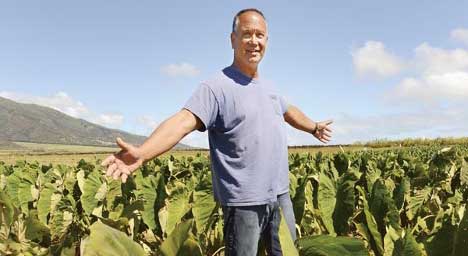Maui Native Hawaiian Chamber initial return to in-person events, April 28

Bobby Pahia is the featured speaker at the Maui Native Hawaiian Chamber of Commerce’s, return to in-person “Talk Story” event at 5:30 p.m. on Thursday, April 28, at the Maui Tropical Plantation Tram Station in Waikapū.
Bobby and some of his team members of Hawaiʻi Taro Farm LLC will share their journey, mission and accomplishments to become a successful kalo farmer. The farm supplies dozens of restaurants with several varieties of kalo and other crops.
Bobby grows two-dozen heirloom kalo varieties in Waikapū, including mana ‘ulu, the popular Maui lehua, and the rare ele‘ele naioea.
Born and raised in rural O‘ahu, the green-thumbed Hawaiian moved to Maui in the 1980s to work for the University of Hawai‘i’s College of Tropical Agriculture and Human Resources.
Growing up, his friends all had to work on taro farms after school — there was no way he would do that kind of hard labor. Nope. Not happening. Never. Bobby refused to be a taro farmer. In his 30s, something changed. “…my whole mission is to get taro and poi back on people’s tables. Right now today, it’s a luxury item. Another one of my missions is to build biology back in the soil,” says Pahia, “We want to make the taro industry sustainable and affordable.”
In addition to Hawaiʻi Taro Farm, Bobby’s extensive farming experience and vision have him serving as a mentor or leader for farmers and others. Bobby is the interim-president of the Mauna Kahalawai Chapter of Hawaiʻi Farmers Union United. He is also managing 310-acre Hoaloha Farms and another roughly 300 acres of farmland owned by developer Mike Atherton. As part of 2,000 acres of a planned mixed-use community called “Waikapu Country Town,” Bobby subleases between 1 and 13 acres to about eight individual farmers.
“The intention isn’t to hoard 300 acres,” he said. “I know how hard it is to get land and water. Long-term leases and water security are a hard thing to come by even as hard work, endurance and passion are essentials to farming”.
MNHCoC president Frank DeRego, Jr. says, “We are eager to safely resume our in-person events with an inspiring, hard-working agricultural visionary such as Bobby. He is a role model demonstrating that a Hawaiian cultural canoe crop, Kalo (taro) is a viable crop in an era of priority of food safety and sustainability.”
Dinner for MNHCoC’s April talk story event will be provided by Cafe O’Lei at the Mill House. No-host cocktails and networking will begin at 5:30 p.m.
Admission is $35 for members and $45 for non-members. Venue capacity is limited, so early reservations are recommended. The deadline for RSVPs is Tuesday, April 26.





_1768613517521.webp)






